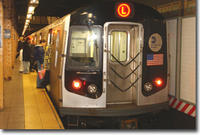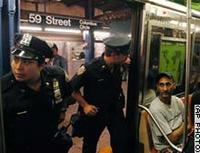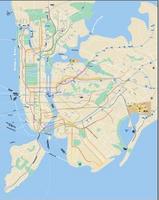Think of the subway as a freight carrier, such as a cargo ship or a
 jumbo jet and the 468 subway stations in 5 different boroughs as the ports and countries receiving and shipping goods. And of course, the 4.7 million daily passengers represent the cargo. How do you ensure the safety of these passengers, with so many points of entry without delaying them? This is the same issue that faces the global supply chain and a company like IBM that ships its products to more than 160 countries. I don't think we have to look much further then C-TPAT.
jumbo jet and the 468 subway stations in 5 different boroughs as the ports and countries receiving and shipping goods. And of course, the 4.7 million daily passengers represent the cargo. How do you ensure the safety of these passengers, with so many points of entry without delaying them? This is the same issue that faces the global supply chain and a company like IBM that ships its products to more than 160 countries. I don't think we have to look much further then C-TPAT.
I think US Customs has the right idea with C-TPAT and its green lane proposal, where basically a level of cooperation and trust is developed with US businesses that meet the outlined security requirements. After a company is C-TPAT validated they can get through ports faster will be eliminated from most searches. I think the same program should be put into place for the NY Subway system. It would work like this.
 Each subway turn style, similar to the scanners at the airport, should be equipped with bomb and gun detection scanners. The typical tourist or bridge and tunnel New Yorker (a term for commuters that have to take a bridge or tunnel to get into NY City) would have to be scanned whenever they use the subway and are subject to regular searches. For the everyday commuter, that has an established residency in New York City and who provides the transit authority with his/her daily subway routine (for example I take the 4/5 in the morning and the Q home five days a week) they get green lane and can avoid scanners and searches.
Each subway turn style, similar to the scanners at the airport, should be equipped with bomb and gun detection scanners. The typical tourist or bridge and tunnel New Yorker (a term for commuters that have to take a bridge or tunnel to get into NY City) would have to be scanned whenever they use the subway and are subject to regular searches. For the everyday commuter, that has an established residency in New York City and who provides the transit authority with his/her daily subway routine (for example I take the 4/5 in the morning and the Q home five days a week) they get green lane and can avoid scanners and searches.I think this would secure the subway system to the level of security that NYC requires to avoid a subway bombing. Just like what could happen if a port closes, if a subway closes the ramifications are more than just an inconvenience. The businesses near the subway will hurt financially and the overflow to the other stations will bring them to their knees, which will lead to a domino effect across the entire city. This obviously intrudes on our rights as Americans, but that is a right I am willing to hand over.



No comments:
Post a Comment